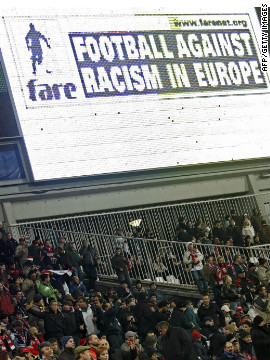Former Ukraine prime minister
Yulia Tymoshenko is serving a seven-year jail sentence for abuse of
office and faces another trial on tax evasion charges. The 51-year-old
displays bruises she claims were inflicted by prison guards. Government
officials deny the claims.
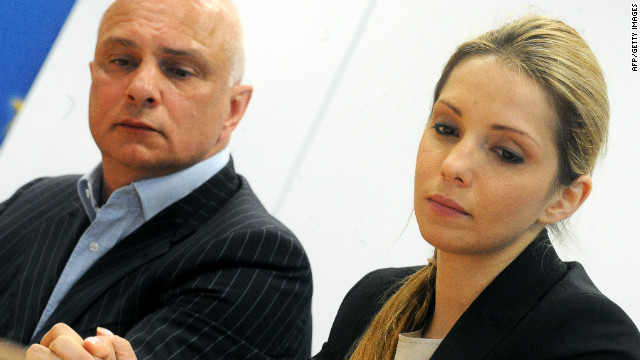 Tymoshenko's husband
Oleksander and daughter Yevgenia hold a news conference to rally
support. Yevgenia claims her mother's life is in danger since starting a
hunger strike more than a week ago.
Tymoshenko's husband
Oleksander and daughter Yevgenia hold a news conference to rally
support. Yevgenia claims her mother's life is in danger since starting a
hunger strike more than a week ago.
A police guard
stands outside Tymoshenko's cell at the Kachanivska prison in Kharkiv.
Her supporters have called on president Victor Yanukovych to quit in the
wake of allegations of abuse.
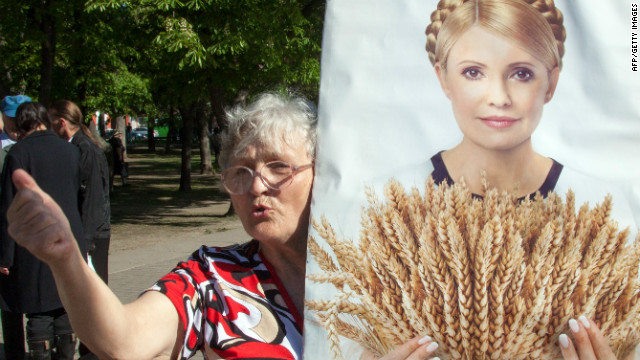 Thousands of
supporters and opponents rallied outside Tymoshenko's latest court
hearing in Kharkiv on April 28. The mixed turnout shows how divisive
Tymoshenko still remains in Ukraine after a spell in government that
began with hopes of pro-Western reforms and ended with allegations of
corruption.
Thousands of
supporters and opponents rallied outside Tymoshenko's latest court
hearing in Kharkiv on April 28. The mixed turnout shows how divisive
Tymoshenko still remains in Ukraine after a spell in government that
began with hopes of pro-Western reforms and ended with allegations of
corruption.
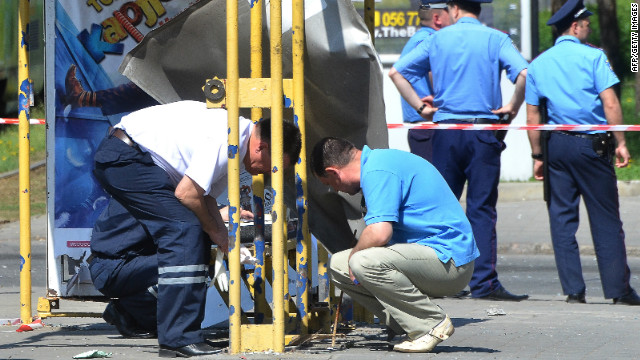 Police experts
examine one of the explosion sites in Dnipropetrovsk, where four bombs
were let off in rubbish bins on Friday. At least 30 people were injured,
raising serious concerns over safety at next month's European
Championships.
Police experts
examine one of the explosion sites in Dnipropetrovsk, where four bombs
were let off in rubbish bins on Friday. At least 30 people were injured,
raising serious concerns over safety at next month's European
Championships.
Pressure is mounting
on president Viktor Yankovych to clean up the country's human rights
record. Following last week's bomb blasts, UEFA took the unprecedented
step of raising political concerns with the host country.
Tymoshenko imprisoned
Devastated family rallies
The people's PM?
A divisive figure
Bombs blast Ukraine
Under-fire Yanukovych
STORY HIGHLIGHTS
- EU Commission's president Jose Manuel Barroso snubs invitation to Euro 2012 final
- He is latest EU leader refusing to travel to Ukraine over its treatment of imprisoned Yulia Tymoshenko
- Ukraine suffering series of upsets including "crook" hoteliers, bombings and snubs
- Govt assures UEFA it is taking all necessary steps to ensure safety of 1.3m visitors
(CNN) -- Pressure is mounting on Ukraine to clean up
its human rights record ahead of the Euro 2012 finals next month, with
the EU Commission's president the latest high-profile leader to boycott
the football championships.
Just weeks before the
tournament kicks off, president Jose Manuel Barroso has rejected an
invitation to attend the final in Kiev -- citing concerns over the
treatment of imprisoned opposition leader Yulia Tymoshenko.
"The president has
decided that for the time being and in the present circumstances he
doesn't want to travel to or attend any events in Ukraine," his
spokeswoman told CNN on Tuesday.
She confirmed this was
due to concerns over the treatment of former prime minister Tymoshenko,
and added: "The EU and president Barroso have sent strong signals of
their serious concerns over what is happening in Ukraine."
Photos emerged on Friday
of Tymoshenko covered in bruises which the 51-year-old claims that
prison guards inflicted. Officials have denied the allegations.
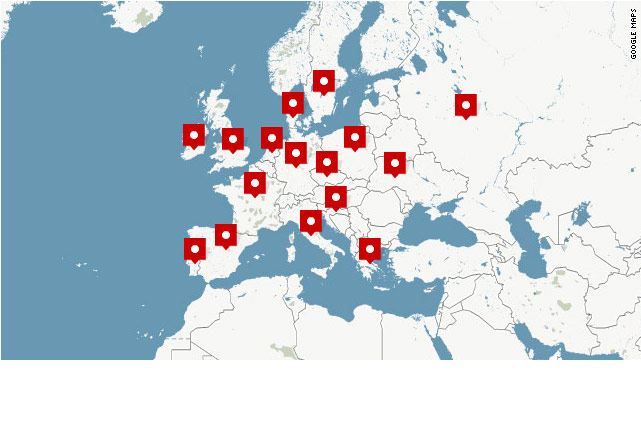 Euro 2012 interactive map
Euro 2012 interactive map
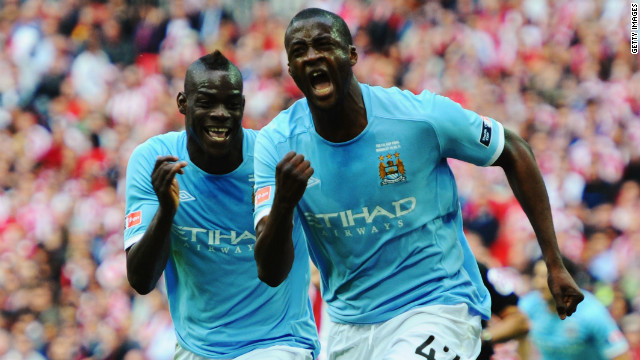 Porto's
fine after its fans made monkey chants at Manchester City's Mario
Balotelli and Yaya Toure was less than the English club's punishment for
being late on the field in another match.
Porto's
fine after its fans made monkey chants at Manchester City's Mario
Balotelli and Yaya Toure was less than the English club's punishment for
being late on the field in another match.
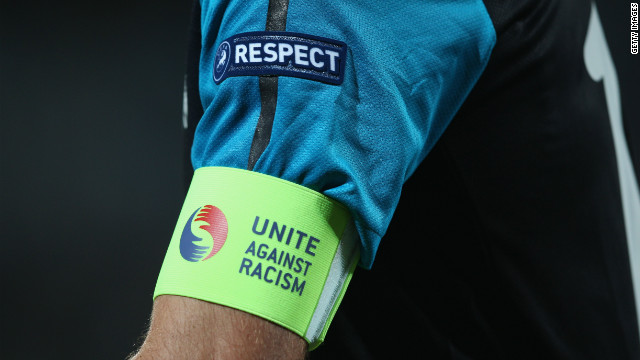 European football's ruling body UEFA has run a "Unite Against Racism" campaign in recent years.
European football's ruling body UEFA has run a "Unite Against Racism" campaign in recent years.
Three-time
world player of the year Lionel Messi with a mascot wearing an
anti-racism shirt ahead of Barcelona's UEFA Champions League match
against Czech team Viktoria Plzen in October 2011.
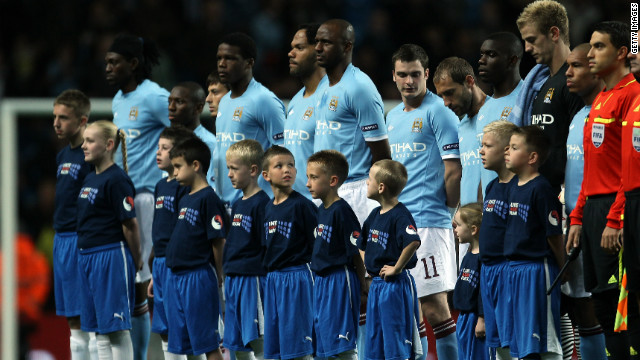 Manchester
City took part in the campaign in 2009 when its players and mascots
wore Unite Against Racism t-shirts for a home match against Polish club
Lech Poznan.
Manchester
City took part in the campaign in 2009 when its players and mascots
wore Unite Against Racism t-shirts for a home match against Polish club
Lech Poznan.
UEFA
has worked closely with the group Football Against Racism in Europe
since 2001. FARE members will be patrolling matches at the Euro 2012
finals looking for evidence of racist behavior.
Proper punishment?
Taking a stand
Messi's message
Manchester City united
Stadium presence
HIDE CAPTION
 UEFA's fight against racism
UEFA's fight against racism
Tymoshenko, a fierce
rival of president Victor Yanukovych, is serving a seven-year jail
sentence for abuse of office and faces another trial on tax evasion
charges.
Daughter Yevgenia said her mother's life is now in danger since starting a hunger strike more than a week ago,
in a statement on the website of British newspaper the Guardian.
European leaders have
continued to turn their backs on the June 8-July 1 event, which will be
co-hosted by Poland, with the EU Justice Commissioner Viviane Reding
also refusing to travel to the Ukraine.
German chancellor Angela
Merkel is reportedly considering missing the tournament, with any such
visit depending on Tymoshenko's release. Her environment minister Nobert
Rottgen has already urged Berlin government ministers to boycott
matches.
Neither Ukraine nor
Poland have previously hosted such a top-level sports event, which is
run by European football's governing body UEFA.
UEFA president Michael
Platini last month complained of "crooks and bandits" hiking hotel rates
in Ukraine, while last Friday bombings in the city of Dnipropetrovsk
raised security fears ahead of the tournament.
The EU and president Barroso has sent strong signals of their serious concerns over what is happening in Ukraine
spokeswoman for Jose Manuel Barroso
At least 30 people were
injured, but the Ukraine government has assured UEFA it was taking "all
necessary steps" to ensure the safety of around 1.3 million fans
expected to watch
16 national teams go head-to-head.
No-one has claimed
responsibility for the bombs, which were placed in four rubbish bins and
exploded at short intervals, but some reports linked them to protests
against Tymonshenko's treatment.
The attacks cast further
doubt over Ukraine's's ability to stage such an event, and UEFA has
taken the unprecedented step of raising political concerns with the East
European nation.
"Even though UEFA, as a
sports organization, never interferes in political matters, it has asked
the Ukrainian delegation to convey these concerns to the competent
authorities," it said.
 Poland continued the countdown to
the Euro 2012 football finals, which it will co-host with Ukraine, with
the opening of the purpose-built National Stadium in Warsaw on Sunday.
Poland continued the countdown to
the Euro 2012 football finals, which it will co-host with Ukraine, with
the opening of the purpose-built National Stadium in Warsaw on Sunday.
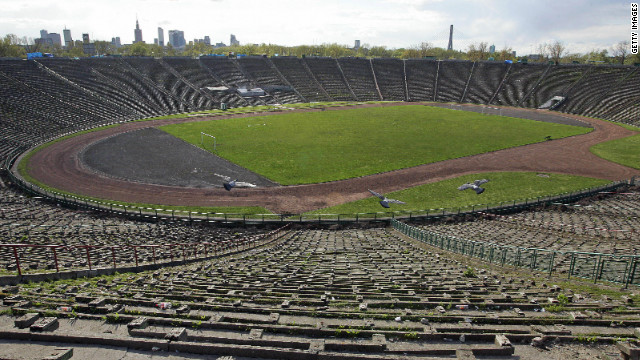 The new
50,000-seater arena is built on the site of the old 10th Anniversary
stadium, which was opened in 1955 and welcomed Pope John Paul II in
1983.
The new
50,000-seater arena is built on the site of the old 10th Anniversary
stadium, which was opened in 1955 and welcomed Pope John Paul II in
1983.
 Construction on the
new stadium began in 2008, with Sunday's celebration marking the end of
four years' hard work. The first stone of the new arena was laid on
October 7, 2009.
Construction on the
new stadium began in 2008, with Sunday's celebration marking the end of
four years' hard work. The first stone of the new arena was laid on
October 7, 2009.
 Fans were anxious to
see with new arena, with the first 40,000 to arrive being rewarded with
a free music festival and fireworks spectacular.
Fans were anxious to
see with new arena, with the first 40,000 to arrive being rewarded with
a free music festival and fireworks spectacular.
 The stadium will
host the first match of Euro 2012, when Poland take on 2004 champions
Greece. It will also be the venue for one of the two semifinals.
The stadium will
host the first match of Euro 2012, when Poland take on 2004 champions
Greece. It will also be the venue for one of the two semifinals.






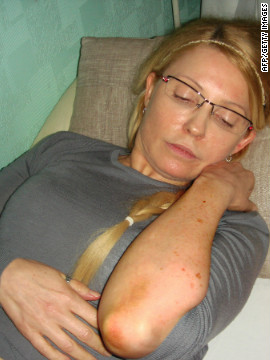
 Tymoshenko's husband
Oleksander and daughter Yevgenia hold a news conference to rally
support. Yevgenia claims her mother's life is in danger since starting a
hunger strike more than a week ago.
Tymoshenko's husband
Oleksander and daughter Yevgenia hold a news conference to rally
support. Yevgenia claims her mother's life is in danger since starting a
hunger strike more than a week ago.
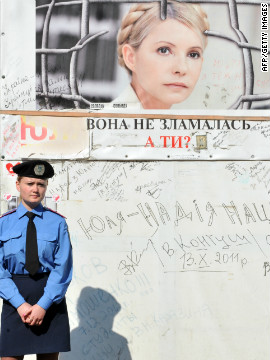
 Thousands of
supporters and opponents rallied outside Tymoshenko's latest court
hearing in Kharkiv on April 28. The mixed turnout shows how divisive
Tymoshenko still remains in Ukraine after a spell in government that
began with hopes of pro-Western reforms and ended with allegations of
corruption.
Thousands of
supporters and opponents rallied outside Tymoshenko's latest court
hearing in Kharkiv on April 28. The mixed turnout shows how divisive
Tymoshenko still remains in Ukraine after a spell in government that
began with hopes of pro-Western reforms and ended with allegations of
corruption.
 Police experts
examine one of the explosion sites in Dnipropetrovsk, where four bombs
were let off in rubbish bins on Friday. At least 30 people were injured,
raising serious concerns over safety at next month's European
Championships.
Police experts
examine one of the explosion sites in Dnipropetrovsk, where four bombs
were let off in rubbish bins on Friday. At least 30 people were injured,
raising serious concerns over safety at next month's European
Championships.
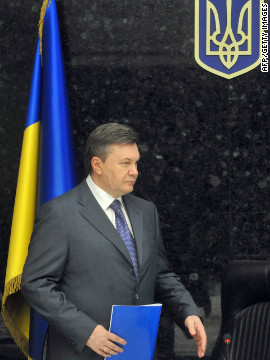







 Porto's
fine after its fans made monkey chants at Manchester City's Mario
Balotelli and Yaya Toure was less than the English club's punishment for
being late on the field in another match.
Porto's
fine after its fans made monkey chants at Manchester City's Mario
Balotelli and Yaya Toure was less than the English club's punishment for
being late on the field in another match.
 European football's ruling body UEFA has run a "Unite Against Racism" campaign in recent years.
European football's ruling body UEFA has run a "Unite Against Racism" campaign in recent years.
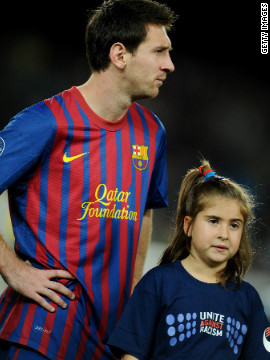
 Manchester
City took part in the campaign in 2009 when its players and mascots
wore Unite Against Racism t-shirts for a home match against Polish club
Lech Poznan.
Manchester
City took part in the campaign in 2009 when its players and mascots
wore Unite Against Racism t-shirts for a home match against Polish club
Lech Poznan.
